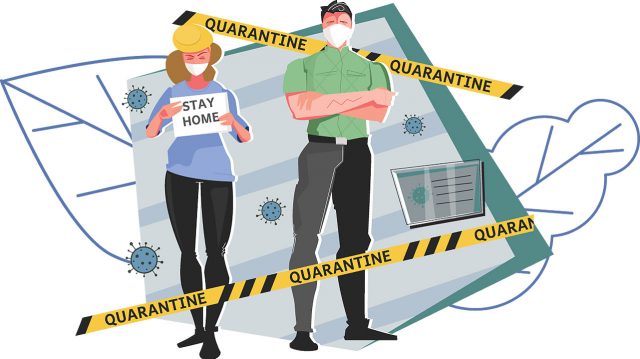
After backtracking from its initial decision, the National Government recently announced that it will push through with the implementation of granular lockdowns. This is being piloted in the National Capital Region until Sept. 30.
Since this pandemic began, the government has experimented with various types of mobility restrictions that until now bring utter confusion to Filipinos. And yet we are in the middle of another scheme, adding to the ever-expanding vocabulary of quarantine measures.
Then again, “granular lockdowns” is not an altogether new concept. It is a rehash of the “localized lockdown” being implemented by the LGUs for more than a year now. This pertains to areas with a high incidence of cases.
What we are seeing is a frazzled response to the continued rise in new COVID-19 cases and woefully inadequate efforts to control the transmission. Lockdowns of whatever name notwithstanding, this virus continues to strain our healthcare system and the economy, aside from bringing grief to the sick and their families. In the past two weeks, more than 20,000 new cases were reported daily. The current positivity rate is almost 30%, which is far greater than the less than 5% recommendation by the World Health Organization (WHO).
There is a clear disconnect between the measures used to address the pandemic and their actual results.
In its recent presentation in the Health Committee Hearing in the House of Representatives, the Department of Health (DoH) says it seeks more than P157 billion from the Congress for 2022 — around a 14% increase from the current year’s allocated budget for health. According to Health Secretary Francisco Duque III, a big portion of the proposed budget, or P78.83 billion, was earmarked for the implementation of programs under the Universal Health Care (UHC) Law, which included COVID-19 initiatives such as providing for 3.8 million COVID-19 tests and laboratory network needs.
In an earlier hearing, however, the Health Secretary admitted that under this National Expenditure Program, there is no budget allotted for the creation of more COVID-19 testing laboratories, and the funding for more vaccines was uncertain. When asked about how long the pandemic will most likely last, Mr. Duque mentioned that “based on the projections of experts and of the WHO, the pandemic could last one or two more years.” Given these pronouncements, it is unclear how the DoH will have enough capacity to curb the spread of the virus.
As the lead agency in the pandemic response, the DoH is expected to provide clear and evidence-based strategies on how to proactively address the health situation of the country. It should also properly relay and coordinate these proposed solutions with other agencies and stakeholders so that there could be a whole-of-society response.
Only this will allow the public to have trust and confidence that the government is really on top of the crisis. When the public is confident that their government is doing the right thing and living by examples, there is no reason why they will not abide by the set rules and regulations, most especially if these are for their own health, safety and/or welfare.
Unfortunately, since this crisis started last year, the efforts of the health agency have always been divided in responding to several uncertainties and controversies. These are recurring issues of negligence, transparency, and alleged corruption that erode the credibility and tarnish the image of the department.
These controversies are unfair to those who work hard, earning their honest keep, passionately serve the public and man the frontlines of the healthcare system. The DoH needs to seriously address management and leadership issues within the organization.
Better health resource utilization and outcomes do not automatically translate into higher health allocations and expenditures. Higher funding for health does not guarantee better pandemic response and progressive implementation of the UHC. A much better course of action is to have a holistic, transparent, and people-centered approach to healthcare, one that duly considers the rights and needs of different health constituents and stakeholders.
As elections draw near — the filing of certificates of candidacy for public office will be in less than a month — different stakeholders can shape a strategic health agenda with clear solutions and policy recommendations. This is to address existing gaps and build a better, more responsive healthcare system.
On Sept. 24, the Stratbase ADR Institute, in partnership with Universal Health Care (UHC) Watch, will gather experts and stakeholders from the academe, public, private, and civil society sectors to share their perspectives and solutions. By injecting a multi-sectoral synergy into the current health equation, we hope to foster a renewed healthcare agenda that is proactive, efficient, evidence-based, and, most importantly, people-centered.
Alvin Manalansan is a Non-Resident Fellow of the Stratbase ADR Institute, and a Convenor of CitizenWatch Philippines.
Fostering a people-centered health agenda
Source: Bantay Radio
0 Comments